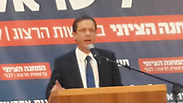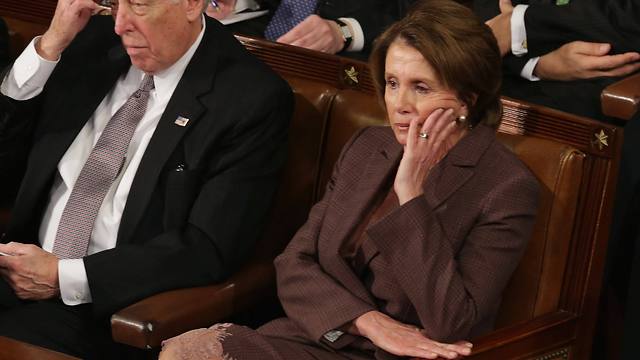
US President Barack Obama said Tuesday that Prime Minister Benjamin Netanyahu didn't offer any "viable alternatives" to the nuclear negotiations with Iran during his speech to Congress earlier in the day.
Speaking from the Oval Office of the White House, Obama said he read a transcript of Netanyahu's speech Tuesday. "There was nothing new" in the speech, he said.
The president said that Netanyahu had made almost the same speech when he warned against the interim deal reached with Iran. That deal, Obama said, has resulted in a freeze and rolling back of Iran's nuclear program.
Netanyahu's alternative to talks amounts to no deal at all, the president said, and that would lead Iran to redouble efforts to build a nuclear bomb.
In his speech, Netanyahu said the deal would all but guarantee that Iran gets nuclear weapons.
House Minority leader Nancy Pelosi also made no effort to disguise her disapproval at Netanyahu's speech shortly after its completion Tuesday, saying she was "saddened by the insult to the intelligence of the United States."
The most senior Democrat to attend the speech to a joint session of Congress, Pelosi exited the chamber before Netanyahu, and issued her less than complimentary statement soon after. Vice President Joe Biden, who would normally preside over joint sessions, was replaced by Republican Senator Orrin Hatch due to a foreign trip. Obama was reportedly participating in a video conference on the situation in Ukraine during the speech.
“The unbreakable bonds between the United States and Israel are rooted in our shared values, our common ideals and mutual interests," Pelosi said. "Ours is a deep and abiding friendship that will always reach beyond party. Americans stand shoulder to shoulder with the Israeli people. The state of Israel stands as the greatest political achievement of the 20th century, and the United States will always have an unshakable commitment to Israel’s security.
“That is why, as one who values the US–Israel relationship, and loves Israel, I was near tears throughout the Prime Minister’s speech – saddened by the insult to the intelligence of the United States as part of the P5 +1 nations, and saddened by the condescension toward our knowledge of the threat posed by Iran and our broader commitment to preventing nuclear proliferation."
Pelosi also contradicted Netanyahu's remark that the agreement currently being formulated was "a bad deal."
“Today, Prime Minister Netanyahu reiterated something we all agree upon: a nuclear armed Iran is unacceptable to both our countries. We have all said that a bad deal is worse than no deal, and stopping the spread of nuclear weapons is the bedrock of our foreign policy and national security," she said. "As President Obama has said consistently, all options are on the table for preventing a nuclear-armed Iran.”
Related articles:
- Netanyahu to Congress: Current deal will all but guarantee nuclear Iran
- Nahum Barnea / Netanyahu speech will be tested by its effect on Iran deal
- Obama: Netanyahu rift not permanently destructive to US-Israel ties
The speech also drew fire from Netanyahu's domestic political rivals. While "there is no doubt that Prime Minister Benjamin Netanyahu knows how to deliver a speech", Zionist Union leader Isaac Herzog said after the speech Tuesday, "it will not stop the Iranian nuclear agreement" currently being drafted.
Herzog was speaking in the immediate aftermath of Netanyahu's address to a joint session of Congress, in which he lambasted the agreement currently being drafted by the leading world powers that aims to curtail Iran's nuclear aspirations.
Israel was facing securitry issues far more worrying than Iran, Herzog said, and vowed that as prime minister, he would work to ensure that Iran did not acquire nuclear capabilities.
Meanwhile, a senior official in the Obama administration said Tuesday that Netanyahu's speech had failed to offer an alternative to the ongoing nuclear talks with Iran.
"Simply demanding that Iran completely capitulate is not a plan, nor would any country support us in that position. The prime minister offered no concrete action plan," the official said, speaking on background.
The official said that the administration was pursuing a deal that "verifiably prevents" Iran from obtaining a weapon, and increases the breakout time "substantially" to a year from the current estimate of two to three months.
"These negotiations are not an opening to a rapprochement with Iran," the official said.
The official said that the proposed length of the deal - a decade or longer - would be "far longer than any other option."
"Military action would set it back by a fraction of that time, at which point Iran would begin to rebuild its program and try to break out for a weapon," the official said.
The official said Netanyahu contradicted himself by arguing that the Iranian government is both "powerful and unchanging" and "weak and vulnerable" and insisting that it needed to change as a condition for a nuclear deal.
"The logic of the prime minister's speech is regime change, not a nuclear speech," the official said.
The president of left-leaning J Street organization, Jeremy Ben-Ami, also said that the speech offered "nothing new."
"The Israeli prime minister has insisted that despite the inappropriate timing of his address, the American people needed to hear what he has to say," Ben-Ami said in a statement, highlighting the controversy caused by the speech.
"But this speech was nothing new. The Obama administration agrees that a nuclear Iran would be unacceptable. The difference is that it is pursuing serious diplomacy to prevent that outcome, and Netanyahu has refused to offer credible solutions.
"Prime Minister Netanyahu offered no serious alternatives today. Who can now say that this speech was worth the considerable cost to the US-Israel relationship?"
















